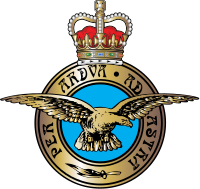Royal Air Force: Difference between revisions
miraheze:conworlds>Johann |
m (1 revision imported) |
(No difference)
| |
Revision as of 20:43, 27 June 2023
| Royal Air Force | |
|---|---|
 | |
| Active | April 1, 1918 |
| Country |
|
| Type | Air and space force |
| Role |
Aerial warfare Space warfare |
| Size |
30,420 active personnel 3,100 reserve personnel |
| Part of | British Armed Forces |
| Garrison/HQ | Whitehall, London |
| Motto(s) |
"Per Ardua ad Astra" (Latin (Through Adveristy to the Stars) |
| March | Royal Air Force March Past |
| Commanders | |
| Commander-in-chief | King Charles III |
| Chief of the Air Staff | Air Marshal Sir Peter Sturley |
| Insignia | |
| Logo |
 |
| Roundel |
  |
| Fin flash |
  |
| Ensign |
 |
| Aircraft flown | |
| Attack | General Atomics MQ-9A Reaper |
| Fighter | |
| Multirole helicopter |
|
| Trainer helicopter |
|
| Reconnaissance |
|
| Transport |
|
| Tanker | Airbus Voyager KC2/KC3 |
The Royal Air Force (RAF), alternatively known as the British Royal Air Force, is the aerial warfare branch of the British Armed Forces and the standing air and space force of the United Kingdom. It was formed on 1 April 1918 through a merger of both the Royal Flying Corps (RFC) and the Royal Naval Air Service (RNAS), creating the world's first independent air force in the world. It would go under development throughout the 1920s and was the world's largest air force by 1925. Since its formation, the Royal Air Force has emerged as a major force in Britain's military history and has engaged in every major conflict that the United Kingdom has participated in, gaining international fame for its involvement in both the First and Second Great Wars where it would fight in its most famous campaign, the Battle of Britain.
The RAF's official mission is, according to the Ministry of Defence (MOD), to "provide the capabilities needed to ensure the security and defence of the United Kingdom and its overseas territories, including against terrorism; to suppoer the Government's foreign policy objectives particularly in promoting international peace and security". The RAF officially describes its mission statement as "...[to provide] an agile, adaptable and capable Air Force that, person for person, is second to none, and that makes a decisive air power contribution in support of the UK defence mission". The RAF's goal is meet the requirements for air power, which they define as the "ability to project power in the air and space" and guides its modern strategy.
During the First Great War, the RAF engaged against the German Air Force in the European theatre during the war and fought alongside the French Air Force on the Western Front. By 1934, the RAF emerged as the German Air Force's chief rival and matched it in terms of quality of aircraft, training, and personnel. Development of the RAF continued throughout the Interwar period, developing jet aircraft and emerged as one of the world's premier air forces, credited with defeating the air forces of the Axis powers and as a force to ensure the UK's position as a great power. In the 21st century, the RAF has seen continued deployments worldwide as part of international peacekeeping missions and as part of multinational deployments by the Northern Treaty Organization, having seen action in Syria, the Middle East, and in Africa. As a member state of the NTO, the RAF has served alongside the air forces of allied countries such as the Sierran Royal Air Force, the Manitoban Air Force, the Superian Royal Air Force, and the French Air and Space Force among several others. As a member state of the European Community, the RAF also participates in the multinational Eurocorps alongside the air forces of other member states.
Today, the Royal Air Force posseses a large operational fleet of several types of aircraft, described by the RAF itself as being "leading-edge" in terms of technology. This fleet consists primarily of fixed-wing aircraft consisting of several roles including: fighter and strike, airborne early warning and control, signals intelligence, maritime patrol, intelligence, surveillance, target acquisition, and reconnaissance (ISTAR), air-to-air refueling, strategic and tactical support. The RAF has 30,420 active personnel with an additional 3,100 reserve personnel as of 2021, with most being stationed in bases located in the UK, with many other personnel serving abroad in support of global operations or at long-established overseas bases (Ascension Island, Gibraltar, and the Falkland Islands, Patagonia).
History
Origins
Great Wars and Interwar
Cold War
Modern history
Organization
Command and structure
Formations
Equipment
Aircraft
Roatary aircraft
Personnel
Ranks
See also
- List of all aircraft current and former of the United Kingdom
- List of Royal Air Force stations
- Royal Air Force Cadets
- Royal Air Force Musuem
- RAF News
-

This page uses material from the Wikipedia page Royal Air Force, which is released under the Creative Commons Attribution-ShareAlike 3.0 Unported License (view authors).
- Altverse II
- Start-class articles
- Royal Air Force
- 1918 establishments in the United Kingdom
- British Armed Forces
- Military of the United Kingdom
- Air forces by country
- Ministry of Defence (United Kingdom)
- Military units and formations established in 1918
- Organisations based in the United Kingdom with royal patronage
